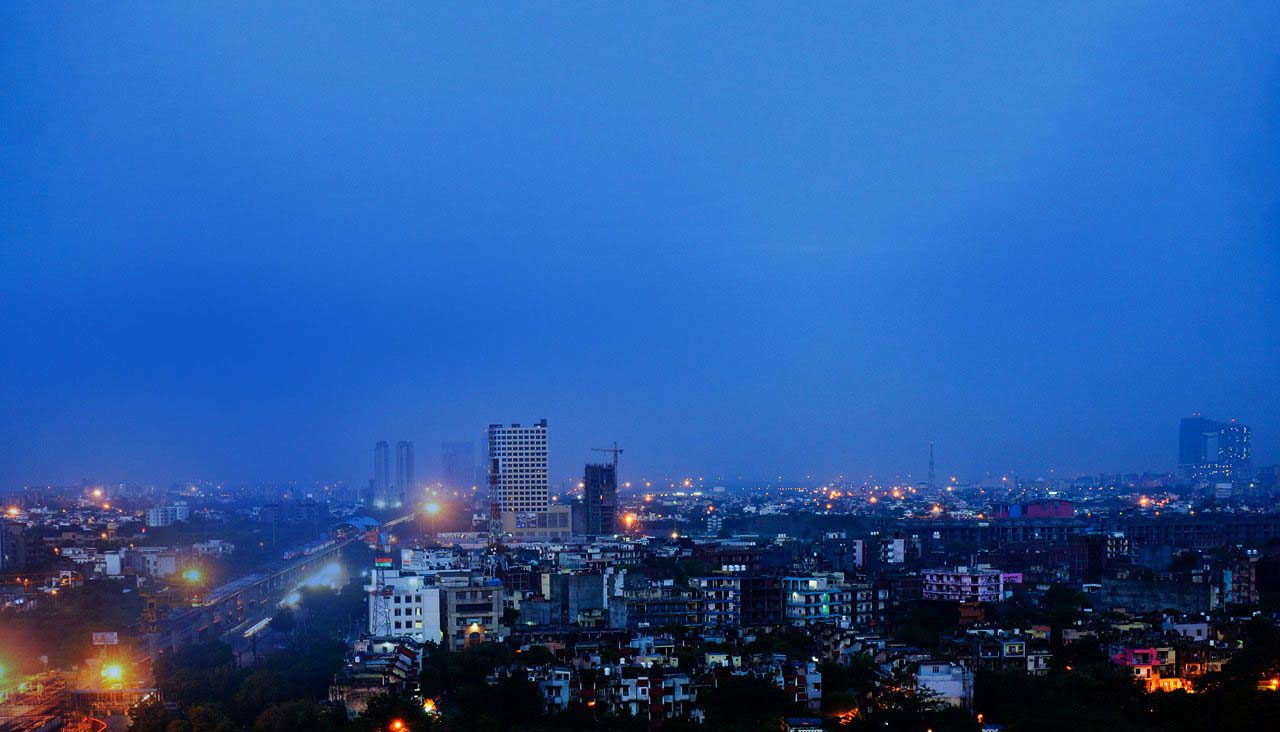Dell Inc. is an American multinational computer technology company that develops computers and related products and services. Dell is pairing technology with innovation to make a positive social and environmental impact – building a Legacy of Good. They were looking to invest in clean green energy in their Indian facilities, and partnered with Tata Power Solar to integrate solar power in their energy mix.
Dell is green conscious company, trying to generate green power wherever possible, thereby reducing the load on the environment. At their facility in Bengaluru, they already have a rooftop solar power plant installed.
Dell had two objectives when they were looking at green energy, namely – power the office premises with renewable energy and reduce the usage of energy for cooling the building during summers.
Tata Power Solar offered to commission a vertical solar system, which would produce the essential clean and green energy to power their office and also cut-off direct sunlight from hitting the building, thus keeping it cool during summers.
This is the 1st time in India that a vertical solar installation has happened on an existing building.
"Andhra Sugars believes in sustainable business and hence we opted for solar in our power usage. We appreciate Tata Power Solar’s professionalism and thank them for completing the project in record time.”
- Mr. P Narendranath Chowdary, Managing Director, Andhra Sugars Limited
The Andhra Sugars Limited, one of the largest Industrial houses in Andhra Pradesh, has always focused on using locally available renewable resources to produce value added products, generate employment and upliftment of rural India. With an aim to promote renewable energy, the company has already established wind farms in the states of Andhra Pradesh & Tamil Nadu, and was looking to take a step forward.
Wanting to try a different approach to fulfill its renewable energy purchase obligations (RPO) for their captive consumption, it was time to go solar for Andhra Sugars at their Chemicals & Fertilizers Division at Kovvur in Andhra Pradesh.
Renewable Purchase Obligation (RPO) is the obligation mandated by Central/State Regulatory Commission, mandating a certain percentage of electricity generated / consumed to be from renewable sources.
Andhra Sugars had more than 15 acres of land space available to develop a solar power plant. After a detailed site survey, Tata Power Solar’s engineering team proposed development of a 3 MW solar power plant. While Andhra Sugars only needed to generate 0.5% of the total energy from renewable sources as per the obligation, they looked to further their green targets by opting for a significantly higher share of their energy sources to be powered by solar resulting in optimal utilization of the available area. The 3 MW plant, built as part of the first phase, contributes to more than 15% of their Kovvur plant’s power requirements.
With a very short timeline of 45 days in hand to commission the plant, the Tata Power Solar team immediately got into action and started preparing the site for installation. Site leveling and marking were carried out within the first few days, followed by pile auguring and installation of the module mounting structures. Since installation was in a low lying area and on a filled-up soil, the structure foundations were custom designed to prevent waterlogging from causing any damage to the system. The installation, with the transmission and distribution facilities in place, was completed well within the timeline.
Safety being a focus area and a subject very close to our heart, Tata Power Solar ensured that there were zero incidents reported during the entire installation & commissioning.
The trendsetting system is equipped with the latest inverters, temperature and irradiance sensors to increase efficiency of the project along with data loggers for remote monitoring and real-time support. The system is capable of exporting any excess power to the grid.
Tata Power Solar has become synonymous with India's most preferred solar developer with proven capability in design & commissioning of projects. An expert in solar technology with an unblemished record to deliver on-time and within budget are credentials that makes Tata Power Solar the preferred name for organizations looking to include solar in their energy portfolio as part of the Renewable Purchase Obligation (RPO).
UltraTech Cement, as part of the Renewable Purchase Obligation (RPO) program, needed to source 0.5% of its energy from renewable energy sources. Under RPO program, Government mandates the minimum percentage that large power consumers need to purchase from renewable energy (RE) source and has been put in place promote the renewable energy sector.
Tata Power Solar helped UltraTech meet this obligation by the design & commissioning of 25 solar power stations of 100 kWp each at its 6 facilities across 5 states in India within a record time span of 5 months. The biggest challenge which comes with such a scale of implementation is the project management across the multiple sites to make sure the project gets delivered as per requirements and within the scheduled time. Also, different locations come with its custom requirements that required Tata Power Solar to custom design the foundations and structures to suit the different site conditions.
This project is a feather in the cap of Tata Power Solar achievements because of the expansive scope and the challenge of delivering it in such a short span of time.
Tata Power Solar successfully completed a 10 MW solar power plant commissioned by Jindal Aluminum Ltd (JAL) in Chitradurga, located 230 km from Bengaluru, Karnataka. Executed in a record timeframe of 4 months from the day the land was made available in January 2012, through this project Tata Power Solar demonstrated leadership in high-efficiency solar power systems and built Karnataka’s largest solar power plant till date. The project resonates of the ingenious design and an engineering team that managed to complete this project in record time by providing a flawless execution and accounted for challenges for a formidable project of this size.
JAL mandated Tata Power Solar to commission a 10 MW solar power plant under the Renewable Energy Certificate (REC) scheme. To provide a sustainable source for energy to Jindal, one of the industry’s renowned manufacturing company, that solely relies on conventional grid connected source of energy for their end-to-end manufacturing posed two-fold challenge – solving for site complexities coupled with a smart plant design. This plant located in Kalamarahalli, near Chitradurga, about 230 km from Bengaluru, Karnataka, has a site classified as complex by terrain due to high wind pressure and a rocky non-agricultural land that is difficult to work with. Tata Power Solar engineering team developed a plan to most efficiently convert the 51 acres of rocky non–agricultural terrain to a solar carpet, making this the first and largest EPC project for Tata Power Solar in the state of Karnataka. The project was executed in a record timeframe of 4 months from the time of land acquisition to be commissioned in June 2013. The solar power plant produces over 18,000 MWh (more than 10 million units) of power per year that is enough to power over 70,000 Indian homes.
The energy generated from the plant is used by JAL for their captive energy needs and the surplus energy is sold to KERC (Karnataka Electricity Regulatory Commission) to help meet community energy needs.
Radha Soami Satsang Beas (RSSB) is a non-profit philosophical organization with its headquarters in Beas, Punjab. It is based on the spiritual teachings of all religions. Radha Soami Satsang Beas Educational and Environmental Society (RSSB-EES) is a charitable organization based at Dera Bhai Jamal Singh, which operates multiple charitable initiatives in the field of environment and education. In line with their vision and the Punjab government’s grid connected rooftop solar policy in place, RSSB-EES decided upon installation of a solar power plant on idle rooftop space, available over the Satsang sheds.
Tata Power Solar took up the engineering, procurement and construction of a 16 MW solar rooftop project for R.S.S.B. Educational & Environmental Society (RSSB–EES). Built across 8 sheltered venues in a single premise, the project is the largest solar rooftop plant in the world, set up in a single phase and will produce more than 150 lakh units of electricity annually.
As a ‘live and functional’ site, with lakhs of devotees at the premises, special focus was given on quality and stringent safety practices.
Engineering
With 46,000+ modules installed on 1.621 million sq. ft. of roof sheds, the engineering application for this project was complex due to many factors:
Given the delicate nature of asbestos and age of roofs, our team strategically custom-designed the structures to transfer the load onto the structure from the brittle roof type. Lifetime analysis of our design was done by a third party auditor, to ensure integrity of the structures with the existing rooftops.
All drilling of the mounting holes was in perfect symmetry for leakage proofing and making a picturesque location.
Keeping in mind the temperature variations in the region, an additional spacing was strategically designed as a ventilation gap between the modules & the roof, enabling a 1-2-degree reduction in temperature. For the first time: ‘underdeck insulated J sheet roofing’ has been used as insulation to break the heat from top, keeping the interiors cooler.
Dichromatic coating has been applied on the mounting accessories making it corrosion free and giving it a longer life.
Execution & cost optimization
The project was envisioned with best-in-class technology, meticulously planned and executed with attention to detail. Our experience of executing large scale projects & foresight helped us in commissioning the project without any major cost escalations.
Quality
Maintaining standards is of utmost importance, when the minimum serviceable life of the installations is 25 years. To achieve this, the material & the equipment used in the project were standardized at the initial stage itself. A working prototype was first developed & executed, based on its success the final implementation was carried out.
Globally bankable Tier-1 multi-crystalline modules were used in the project to deliver high performance & low degradation for a sustained 25-years energy generation.
Operating efficiency
The plant has maintained an average 10% surplus energy generation, with a surplus generation range of 3.5% to 19.9% as per seasonal variation, during last 6 months. The average plant load factor has been 18.1%, with a maximum of 20.3%.
The plant delivered an average uptime of 99.7% during the last few months of operation, against a committed uptime of 98%. We have implemented a central SCADA system, enabling real-time monitoring of the solar power plant.
We have also implemented synchronized module cleaning system - improving the cumulative performance of the entire block. In order to have a negligible downtime due to a component failure or malfunction, the necessary spares are managed by using hub & spoke model, maintaining the availability at all times.
With Tata Power Solar’s experienced project management and execution capabilities, the project was executed within the defined timeline, leading to on-time commissioning of the plant.
The plant will produce more than 150 lakh units of power annually and all the solar power plants at the site cumulatively offset over 19,000 tonnes of carbon emissions every year.
The grid connected system, equipped with net metering can feed surplus electricity to the grid under the Punjab government’s grid connected rooftop solar projects scheme.
Tata Power Solar has used proven technology and best-in-class equipment to ensure long quality life of the solar power plant. The solar modules come with a 25 years’ warranty and reliability of India’s largest solar player, backed by Tata Group.
The solar power plant currently provides employment to 10 people from the local community, who maintain the plant on day-to-day basis. During the course of installation & commissioning, this local manpower was trained on installation, operation & maintenance of a solar power plant, enabling them with skills for their lifetime.
HMR Institute of Technology & Management is a leading private Engineering College located in New Delhi, India offering both Management & Engineering courses. With its vision of going green, they were looking for a trusted partner to start their renewable journey.
Tata Power Solar commissioned a 146 KW rooftop system at HMR institute. The institute now runs completely on green energy, with 100% of its energy requirements fulfilled by solar. The institute also leads the students towards Green Technologies by giving them access to live solar projects.
The rooftop solar system generates 2,04,000 units of electricity annually and will offset 3,679 tonnes of carbon over next 25 years.
“Given our ambitious target for green power, we were aware that our requirement of rigorous timelines and cost-efficiency was a challenging one. We thank Tata Power Solar for their experience and commitment in delivering this large scale project ahead of strict timelines.”
Mr. A.K. Jha, Director (Technical), NTPC
Aligning with the Government’s ‘Make in India’ mission and bringing together our core strengths in domestic manufacturing and EPC services over the last 25 years, this 100 MW plant is the largest project commissioned using domestically manufactured solar cells and modules by Tata Power Solar to date.
Location: Cochin, Kerala, India
Tata Power Solar commissioned 2.67 MW solar carport at Cochin International Airport. The project comprised of putting together 8472 solar panels on 27 carports spread over 20289.9 square meter of area. The entire solar plant is aimed towards reducing 1868 tonnes of CO2 annually.
The grid-connected carport plant required high-level engineering and designing skills for assembling the massive carport structures. Additionally, advanced technology and design was of utmost importance to match and maintain the quality standards in place.
Mr. V J Kurian, Managing Director, Cochin International Airport Limited, said "Cochin International Airport Limited became the first Airport in the world to be fully powered by solar energy during August 2015. It has now accomplished another milestone by implementing India's largest solar carport. We appreciate Tata Power Solar's professionalism and thank them for completing this project in a record time."
Mr. Ashish Khanna, ED & CEO, Tata Power Solar, said "It is a matter of great pride for us to be able to fulfil client's objective in meeting the requirement of solar panels and in the process setting up of India’s largest carport. The project is a benchmark in terms of engineering expertise utilized in terms of complexities encountered considering the high water levels in backfilled lands. The modular design has helped us to execute the project in a record time and we are looking forward to more of these initiatives being replicated in other airports and commercial establishments."

Tata Power Solar as India's largest integrated solar solutions provider has rightfully earned the title on their core mantra of always maintaining the project timelines and executing within tight budgets. Always the first choice for the Government agencies when it comes to executing solar power projects, Tata Power Solar's unwavering commitment to the core values continue to lead and pave the way to harnessing the power of sun and enabling solar energy in the remotest of locations across India. The case study showcased here is a shining example of how Tata Power Solar has leveraged its capabilities to touch the lives of millions in the beautiful Leh valley who for centuries have struggled to have ready access to energy for basic necessities – be it light, hot water or electricity.
The local renewable energy agencies and MNRE recognized the villages that were devoid of any sustainable source of energy, partnered with Tata Power Solar to design solar power project that powered over 100 villages where grid connectivity was next to impossible.
To solarize these many villages sprouting between Leh and Ladakh spread over a wide region, posed an enormous gamut of challenges due to the weather, altitude and topography of the region. Tata Power Solar proposed microgrids as a solution to power cluster of villages as well as provide decentralized solar power system to villages in the remote area. During 2009-13, a total of 86 microgrids of 5kWp-115kWp, with an aggregate capacity of 1MW were installed across remote and inaccessible villages in both Leh and Kargil. The installation of these solar powered microgrids brought an irreversible change through the region with access to a sustainable source of energy. In addition to these microgrids, Tata Power Solar also commissioned lighting projects to over 300 villages spread across. As part of this, over 15,000 home lighting systems were installed, which include solar lanterns, home lighting systems and street lighting systems.




27 years and counting: the Tata Power Solar journey at a glance, a history rich with experience and achievements.

Here are all the latest happenings from the world of Tata Power Solar